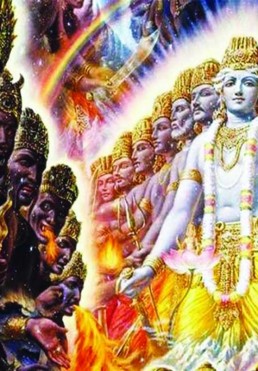The dark features of the ugly personalities in the world were never before so strikingly brought within the embrace of a simple stanza. All the Satanic forces that can ever come to express in the bosom of man have been brought together under some all-comprehensive ‘types’ of devilish-ness, as indicated here. To know them would be a sufficient warning of what we must avoid and what all traits, in us, we must carefully weed out from our mental composition, so that the greater energy that is available to a well-developed man, may, without any obstruction, flow out of our bosom.
HYPOCRISY (Ostentation — Dambha) — ‘Pretending to be righteous but living unrighteous ways of life’ is the meaning that Shankara gives to this term. Hypocrisy is, certainly, one of the cheapest poses assumed by the vicious. To them, all their superficial glow of goodness and purity, of religiosity and sincerity are but attractive hoods to cover their deadly motives and ugly intentions.
ARROGANCE (Darpa) — Endless pride of learning, or of wealth, or of social status, or of family connections, gives to an individual a kind of insufferable uppishness, and he looks at the world and the happenings around him through this misinterpreting and self-deluding medium and lives in a world of imagined self-importance resulting in an arrogance that drives away all inward peace. Such an individual gets exiled from the love of the community around. An arrogant man is a lonely creature in the world and his only companions are his own imagined self-importance and dreams of his glories which none but he can see. And naturally he becomes highly self-conceited (Abhimanah).
ANGER (Krodha) — When such a self-conceited, arrogant, hypocrite looks at the world around him and finds that the world’s estimate of him is totally different from his own estimate of himself, he revolts within and hence his wrath (Krodha) at everything around him. And once such an individual gets worked up with anger, in his speech and action, there must necessarily be a disconcerting insolence (Parushya).
Such arrogance, self-conceit, wrath and insolence — arise from his own self-delusions (ajnanam). He knows not himself, that he is ignorant of the scheme of the world around him, and consequently, he is blind to the right relationship that he should maintain with the world around him. In short, he is extremely ego-centric and he expects the world to be what he wants it to be, and, in his delusion, he supplies a mad blue-print prescribing how the world of healthy beings is to behave and act in his field of actions. This ignorance of oneself and one’s relationship with the things and beings around is the secret cause that generally forces one to revolt against the environments and act quixotically.
Such people are termed here by Krishna as the ‘Diabolically Fallen,’ the Asuric. Such a spectacular contrast provides by the picture of the Asuric, as given here, gloriously brings out the earlier picture of the ‘Divinely Good’ — the Daivic, in relief.
THE EFFECTS OF THE TWO NATURES — THE DIVINELY GOOD AND THE DIABOLICALLY FALLEN — ARE SPOKEN OF AS FOLLOWS:

